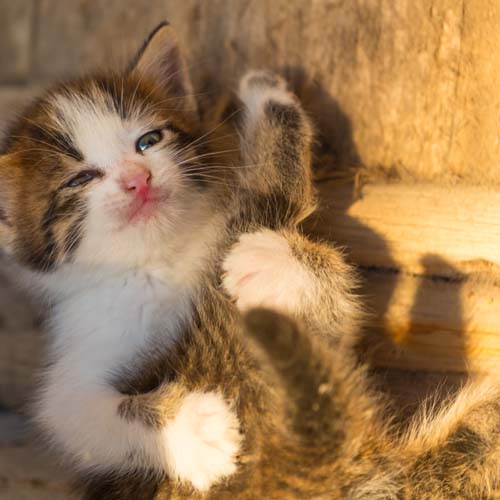Cat Spay and Neuter
Everything You Need to Know About Cat Spaying and Neutering Surgery
At Cloverleaf Animal Hospital we provide the best cat spay and neuter services for your pet.

What is cat neutering?
Cat neutering is a broad term that people generalize for altering a female or male cat. We here say neutering is for a male cat. It’s the removal of the reproductive organs of a male cat, which would be both with their testicles.
How does spaying or neutering impact the health and wellbeing of my cat?
This is kind of a generalization question, and it can get pretty involved. So we’ll break it down between the boys and the girls. The procedure is beneficial for both male and female cats’ well-being. It helps in their overall health as they get older, for females especially. By spaying early on, you decrease the chance of developing mammary cancer. For boys, it’s more of a behavioral issue, where you’re not going to have roaming, fighting behavior, and aggressiveness. You don’t have the strong urine odor created when the testosterone levels get high if they stay intact. We typically recommend this with females because you don’t want a pregnancy. Unfortunately, we all know there’s a problem with overpopulation, and there can be several kittens litter. So it is beneficial to go ahead and spay and neuter.
How soon should you bring your cat in to see a veterinarian to get them spayed or neutered?
Here at Cloverleaf Animal Hospital, we usually recommend spaying or neutering your cat between five and six months of age or later. There are a lot of clinics that will do early spay and neuters. A lot of the shelters will perform early spay and neuter, some as early as eight weeks of age. We prefer them to be between three and a half to four pounds at the lowest range because there are anesthetic risks involved when they’re younger. There has been some research done on male cats being neutered early, which can contribute to them having urinary issues as they get older. So we typically recommend that they are fully vaccinated. When they get to the age of four, four and a half months, you should do it. Usually, by five or six months of age, they’re ready to be spayed or neutered.
How will spaying or neutering affect my cat's behavior?
If your cat is an outdoor kitty, it will definitely lessen their behaviors and intentions to want to roam again. They hopefully will not fight because that fighting behavior will decrease, and they won’t be at risk for bite wounds and abscesses and contract feline leukemia through those bite wounds. It will also decrease urine marking and territorial behaviors. That goes for inside kitties too. Often, if you have an inside kitty, especially the males, they have very strong odors. So it amazes me sometimes when owners come in, and they have an intact male, and I’m like, how do you deal with that strong urine in the house? That definitely subsides once they’re neutered. Even if they’re indoor kitties and there are outside cats, when they’re in heat, usually in the spring and fall, inside cats do recognize that behavior on the outside. So you can have behavioral issues occurring inside your house if they’re intact.
What are some possible conditions that can be helped or prevented by spaying or neutering my cat?
The big one for females would be pyometra, which is a term that we use for an infected uterus. They are at higher risk as they age and every time go through a heat cycle. An infected uterus can be closed or open. Both of them are critical situations, but if you have a uterus that is infected and ruptures, it’s an emergency situation. And unfortunately, it can be fatal. The treatment for that is going in and spaying the cat at that time and removing the ovaries, the uterus, and a portion of the cervix. But at that time, it’s infected, and there is a high risk of sepsis, which can be fatal. So that’s one of the greatest problems that we see again if they’re in for the females. And again, there’s a risk of mammary cancer for females as well.
How should I care for my cat before and after surgery?
There’s not much care before surgery. The night before the surgery, we recommend fasting the animal. For both your male and female kitties, there will be going under anesthetics, an injectable anesthetic, a gas anesthetic, or a combination of both. We don’t want them to have any food in their belly if they vomit from the anesthesia, pre-med, or even after. There is a risk of aspirating during recovery, so we definitely want to decrease that potential. So they should be fasted before, and we usually recommend leaving the water out so that they stay well hydrated. That’s pretty much what we do the night before. Here, we typically send them home the same day, so the surgeries are done in the morning, and they’re able to go home back to the owner late afternoon or early evening. We always send home a little go-home sheet, and they go home with pain medications and appropriate treatments if we find other things at that time. The recovery time’s about seven to 14 days. The biggest problem that we see post-surgery is trying to keep your little kitten or your younger cat quiet and restricted. That means no jumping on furniture or jumping off of countertops or cat trees. It can cause some problems with swelling and tissue irritation. It can open up the incision, so they should be restricted and follow those guidelines. For the females, because they have an on their abdomen, we recommend watching every day to just check and make sure that the incision looks OK and that it’s not gaping open, they’re not licking at it, that there’s no redness, swelling, or any drainage. If that occurred, we would ask the owners to call so we could get them back and make sure it’s not anything that we have to treat. With the males, it’s actually quite easy because, with their surgery, there are only two small incisions over the scrotum to remove the testicles. And those areas usually stab over within 24 to 48 hours. So there is very little to no care for a male kitty after the surgery.
If you still have other questions and you’d like to reach out to us, you can call us directly at (330) 948-2002, email us, or reach out on social media. But please do reach out, and we’ll get back to you as fast as we can.
Veterinary Services
Below are all of the veterinary services we offer at Cloverleaf Animal Hospital. If you have any questions regarding our services, please feel free to call us.
